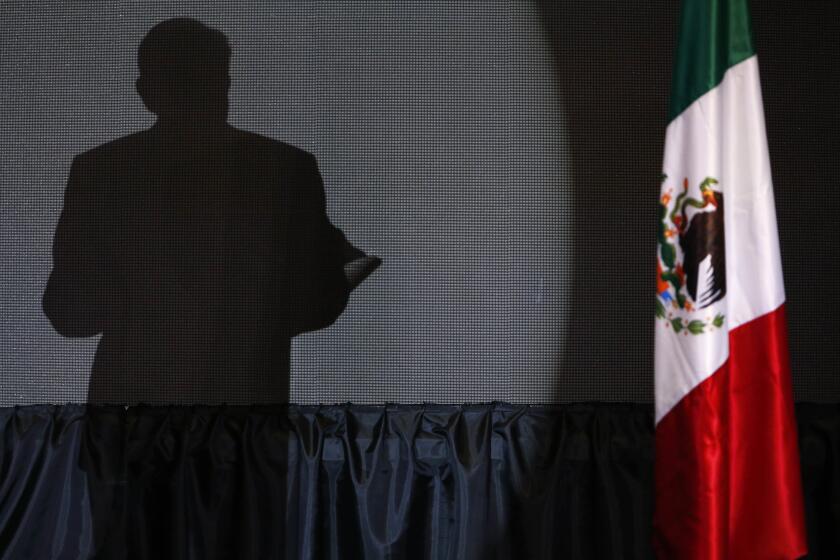Teen Detainee Boycotts His War Crimes Trial
Canadian teenager Omar Khadr refused Wednesday to participate in the war crimes case against him, in protest of being moved to what was described as solitary confinement.
The military tribunal’s presiding officer, Col. Robert S. Chester, put off a defense motion seeking Khadr’s return to the least restrictive holding facility, but he did agree to consider hearing testimony on the highly secretive detention procedures.
Khadr and nine other detainees being charged in a military tribunal at the U.S. naval base were reportedly transferred to the facility’s maximum-security camp.
Khadr, who was 15 when he was captured in Afghanistan, read a handwritten note saying he was being punished unfairly after cooperating with his captors. Khadr, now 19, is accused of taking part in a firefight that killed a U.S. Special Forces medic.
Defense lawyers and human rights observers said the 10 detainees were moved before dawn on March 30 to the maximumsecurity Camp 5.
“He’s been transferred from what we believe is the best facility here to the worst,” said American University law professor Muneer Ahmad, Khadr’s civilian defense counsel. He said his client had been in medium-security Camp 4, where detainees with the best behavior records were accorded “comfort items” like books, games and shoes.
Fewer than half of Guantanamo’s 490 prisoners are believed to be at Camp 4, which has a sports yard, communal meals and barracks.
A halt to the practice of pulling prisoners from the general population ahead of court appearances or meetings with counsel was ordered by U.S. District Judge James Robertson in November 2004, when he ruled that the U.S. military tribunal was unconstitutional in its denial of due process to defendants.
Guantanamo officials confirmed that “most” of the 10 men charged so far with war crimes had been moved to the newest and most secure of its facilities.
“Consistent with Army regulations, individuals in a pretrial status are separated from the general population. These measures are largely for the protection of the detainee,” said Navy Cmdr. Robert Durand, spokesman for the prison network.
Durand disputed the defense’s description of conditions in Camp 5 as solitary confinement.
“Detainees in Camp 5 live in a normal prison setting, each in a cell in a wing that houses multiple other detainees,” Durand said.
Khadr, a gangly 6-foot-1 youth whose Egyptian father and Palestinian mother took him on trips to Pakistan throughout his childhood in Canada, enunciated his plea in heavily accented English.
His scrawled statement read: “Excuse me mr jugde im being punishede for exersizing my wright and being cooperative in perticepating in this milirtery commission. For that I say with my respact to you and everybody eles hear that I’m boycotting thes persedures untel I be treted humainly and fair.”
Ahmad said his client had “gaps” in his comprehension of English and of his parents’ native Arabic.
Khadr is charged with conspiracy, murder, attempted murder and aiding the enemy. The murder charge stems from the death of Sgt. 1st Class Christopher Speer in a clash involving U.S.-led coalition forces in Afghanistan in 2002.
Chester’s agreement to take up the detainee treatment issue followed a bout of military courtroom theatrics.
Khadr’s lead attorney, Marine Lt. Col. Colby Vokey, slammed the defense table in frustration when the judge admonished him for not mentioning the transfer issue Tuesday.
“If you want relief for that issue, it’s incumbent on you to give me a heads-up,” Chester said.
Vokey responded angrily, “That’s exactly what we talked about all day yesterday!”
Chester ordered a recess and meeting with attorneys from both sides, after which he said he would decide this week whether to summon witnesses from the camp administration and the military police guarding the camp.
Khadr’s civilian attorneys, Ahmad and American University colleague Richard J. Wilson, refused to address the court for the rest of the hearing, saying they were bound to abide by their client’s wish to boycott further proceedings.
Chester ordered Vokey and Army Capt. John Merriam, another defense lawyer, to continue with procedures evaluating the presiding officer’s fitness to hear Khadr’s case.
Vokey challenged Chester’s ability to fairly preside over Khadr’s trial, noting that the career military jurist -- who had been due to retire from the Marine Corps in June -- had applied to be a Justice Department immigration judge under Atty. Gen. Alberto R. Gonzales.
Former White House counsel and key architect of the Guantanamo judicial network, Gonzales has a personal interest in seeing his military tribunal produce convictions of war crimes suspects, Vokey said.
More to Read
Sign up for Essential California
The most important California stories and recommendations in your inbox every morning.
You may occasionally receive promotional content from the Los Angeles Times.











